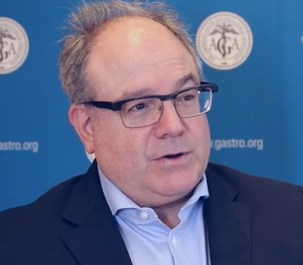User login
BOSTON – In the next 5 years there is going to be a “huge swing” in gastroenterology to minimally invasive therapies, improved diagnostics, and additional therapeutics and disease management strategies that can be applied on an ambulatory basis and, perhaps, even in the office.
That’s the prediction of Michael L. Kochman, MD, AGAF, of the University of Pennsylvania, Philadelphia, who is the executive committee chair of the American Gastroenterological Association Center for GI Innovation and Technology. In a video interview conducted at the 2017 AGA Tech Summit, sponsored by the center, Dr. Kochman discussed five emerging trends in gastroenterology.
The trends include advances in endoscopic technologies and an expansion of the role of personalized medicine that would allow gastroenterologists to better target medications to individual patients. Office-based physicians will be able to evaluate patient risk for various diseases more easily through the use of stool or blood samples or cheek swabs and, then, steer toward additional tests for those found to be at high risk. Improvements in patient safety also are on the horizon, he said, as new technologies will provide earlier warning signs of failed therapies and potential complications.
Finally, as innovation continues in the area of minimally invasive surgery and transorifice surgery, “we need to look more and more to what we will end up calling organ-preserving surgeries, where we are able to treat just the area of pathology,” he noted. “We will be moving to leaving the patient without lasting scars and remembrances of having to have an organ removed.”
Dr. Kochman disclosed that he serves as a consultant to Boston Scientific and Dark Canyon Labs.
BOSTON – In the next 5 years there is going to be a “huge swing” in gastroenterology to minimally invasive therapies, improved diagnostics, and additional therapeutics and disease management strategies that can be applied on an ambulatory basis and, perhaps, even in the office.
That’s the prediction of Michael L. Kochman, MD, AGAF, of the University of Pennsylvania, Philadelphia, who is the executive committee chair of the American Gastroenterological Association Center for GI Innovation and Technology. In a video interview conducted at the 2017 AGA Tech Summit, sponsored by the center, Dr. Kochman discussed five emerging trends in gastroenterology.
The trends include advances in endoscopic technologies and an expansion of the role of personalized medicine that would allow gastroenterologists to better target medications to individual patients. Office-based physicians will be able to evaluate patient risk for various diseases more easily through the use of stool or blood samples or cheek swabs and, then, steer toward additional tests for those found to be at high risk. Improvements in patient safety also are on the horizon, he said, as new technologies will provide earlier warning signs of failed therapies and potential complications.
Finally, as innovation continues in the area of minimally invasive surgery and transorifice surgery, “we need to look more and more to what we will end up calling organ-preserving surgeries, where we are able to treat just the area of pathology,” he noted. “We will be moving to leaving the patient without lasting scars and remembrances of having to have an organ removed.”
Dr. Kochman disclosed that he serves as a consultant to Boston Scientific and Dark Canyon Labs.
BOSTON – In the next 5 years there is going to be a “huge swing” in gastroenterology to minimally invasive therapies, improved diagnostics, and additional therapeutics and disease management strategies that can be applied on an ambulatory basis and, perhaps, even in the office.
That’s the prediction of Michael L. Kochman, MD, AGAF, of the University of Pennsylvania, Philadelphia, who is the executive committee chair of the American Gastroenterological Association Center for GI Innovation and Technology. In a video interview conducted at the 2017 AGA Tech Summit, sponsored by the center, Dr. Kochman discussed five emerging trends in gastroenterology.
The trends include advances in endoscopic technologies and an expansion of the role of personalized medicine that would allow gastroenterologists to better target medications to individual patients. Office-based physicians will be able to evaluate patient risk for various diseases more easily through the use of stool or blood samples or cheek swabs and, then, steer toward additional tests for those found to be at high risk. Improvements in patient safety also are on the horizon, he said, as new technologies will provide earlier warning signs of failed therapies and potential complications.
Finally, as innovation continues in the area of minimally invasive surgery and transorifice surgery, “we need to look more and more to what we will end up calling organ-preserving surgeries, where we are able to treat just the area of pathology,” he noted. “We will be moving to leaving the patient without lasting scars and remembrances of having to have an organ removed.”
Dr. Kochman disclosed that he serves as a consultant to Boston Scientific and Dark Canyon Labs.
FROM THE 2017 AGA TECH SUMMIT
